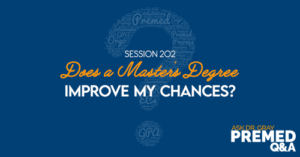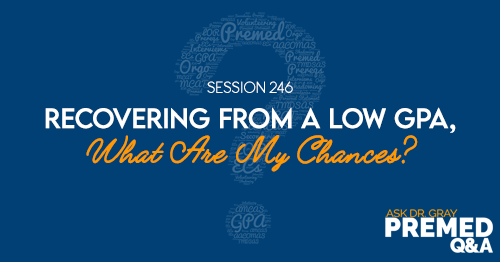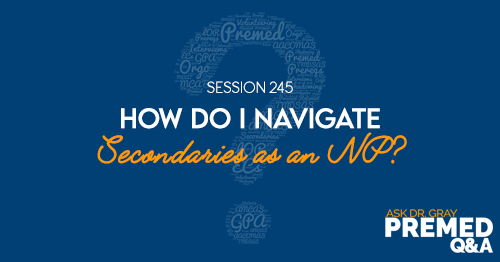Apple Podcasts | Google Podcasts
Session 202
This premed wants to know if he needs to get a master’s degree during his gap year or if he’s better off doing research. Which of the two seems like the best choice?
Ask Dr. Gray: Premed Q&A is brought to you by Blueprint MCAT. Listen to this podcast episode with the player above, or keep reading for the highlights and takeaway points.
The episodes in this podcast are recordings of our Facebook Live that we do at 3 pm Eastern on most weekdays. Check out our Facebook page and like the page to be notified. Also, listen to our other podcasts on MedEd Media. If you have any questions, call me at 617-410-6747.
[00:28] Question of the Day
“I have gone to a program called the master of biomedical informatics program at Harvard Medical School. It was at medical school, but it’s just a master’s program, Whereas I can have a choice to work. I’m from UC San Diego. So I can work in my lab for two more years. I was really just struggling about which one should I choose because obviously, the massive program costs well over $100,000.
If I go to MD/Ph.D. or just MD, that will be my research focus. It’s one of the areas that I’m really interested in. It’s also the reputation I guess, and if I didn’t get into medical school, I’ll at least have a master’s program. I have a master’s degree.”
[03:08] Master vs. Research
The master of bioinformatics has the Harvard name attached to it. This student is interested in it and it’s a lot of money. Compare that to his current situation where he’s working in a lab. It turns out this student has already made the decision to go to Harvard. But for the sake of discussion, he’s interested to find out what I have to say.
Now, the tuition for me is a nonstarter because it’s not worth it for me. But that’s my decision and everyone in this situation has to make the decision for themselves. Obviously, the ability to go to Harvard Medical School to get this degree may open up some doors that will change the direction of your career.
This is a part of the process where you really don’t know what the alternative is because you can only pick one thing. You move forward with that and you’ll never know what the alternative looks like.
And so, if you’ve made a decision and you’re excited about it because it’s what you want to do, and you’re not doing it to check some boxes or whatever, then that’s awesome. That’s the fun part of this process. The goal of this all is to be able to tell your own story. In order to do that, you have to live your life. So many people are asking on forums as to what life they should live.
“To be able to tell your own story, you have to live your own life.”Click To Tweet[08:14] Following Your Interests and Passions
This student has a 3.8 GPA and so his GPA is fine. So taking the master’s is not about boosting his GPA but more about his interest. He is doing this to live his life for himself, and not for the medical schools or for the admissions committees.
And if he’s getting A’s, it’s going to help in terms of showing more coursework and a good GPA from Harvard Medical School. But at the end of the day, he wants to be learning about informatics because that’s what this student is interested in. So that ultimately is what’s going to matter the most.
[10:22] How to Show Less Research to MD Programs
Q: “I will have two more years of research. I’ve been doing research since my freshman year, actually. So by the time I apply, I will have five years of research and only two years of clinical experiments. This will be great for MD/Ph.D. programs, but for normal MD programs, how do I make it sound less like research?”
A: You can’t hide who you are, and who you are is someone who has a lot of research experience. And that’s going to come through on your application, whether you’re applying for MD/Ph.D. or just MD.
You can’t be apologetic about that. That’s just who you are. That’s what your interests are, and that’s perfectly fine.
As long as you’re getting the clinical experience, shadowing, etc, that shows you’re passionate about patient care too and making a difference in patients’ lives directly, not just indirectly through research, then you don’t have any issues at all.
Now, this student is concerned about having only online shadowing, it could put him at a disadvantage. Right now, we’re at a stage of the pandemic where there are plenty of opportunities to shadow in person. You may have to ask 20-30 people, but you can find shadowing opportunities.
[12:19] Taking the MCAT in Less Than a Month
Q: “I already scheduled for the MCAT on August 27th and then I’m also taking summer courses. So I have less than a month (at the time of this recording.)”
A: For clarification, he’s taking the exam in August this year to apply next year. I just wanted to make sure the timeline works so he doesn’t end up taking the MCAT too early so the score could expire if there are other issues.
Taking Your Time to Prep for the MCAT
My best recommendation for this is to push back the MCAT. There’s no reason to take it next month. It would also be good to be asking around other students what it’s like to be in the same boat. He can’t just ask one student (which was what he did) because we don’t know what that student was like either. So he has to get the big picture, take all that information in, and integrate them into who he is.
There’s no point in adding that much stress to any student who’s only prepping for one month, and not needing to take the MCAT so soon if they’re not applying until next year.
If you look at your schedule and look at everything else, you can clear off your schedule and only focus on the MCAT for a month. This may be very doable for this student – or not. And so, there has to be some self-reflection to see what is best for anyone in this situation.
Make Use of a Study Plan Tool
Moreover, a great help for studying for the MCAT is to have a study plan in place so you can get things organized. Sign up for a free account at Blueprint MCAT and get access to their free study planner tool. Try and see what a one-month or three-month study schedule looks like. If it’s not doable, then make it a six-month prep. Figure out what works best for you.
[18:11] Do I Have to Have Nonclinical Activities?
Q: “I’ve been talking to other medical students as well. They said that I might need some clinically related community volunteering experience, for example, local clinics or helping the community with minorities. But then I feel like I’m checking the box if I force myself to do it.”
A: Clinical experience can be paid or volunteer. For example, if you’re a nurse, you don’t have to also volunteer in some sort of community health clinic. Then shadowing is also very important. On top of that, there’s research, which is overrated for most premed students.
'Clinical is clinical – paid or volunteer – that doesn't matter.'Click To TweetThere is also normal nonclinical volunteering, like going to the homeless shelter, going to a soup kitchen, or doing Habitat for Humanity stuff. Those are nice to have and it’s great as a person to do those things and to be able to contribute to the community. There are some medical schools that want to see that, but in most medical schools, you’ll be fine if you don’t have any of that.
[20:02] Lacking Prereqs Before Your Apply
Q: “What if I’m missing one or two classes?”
A: You just need to make sure that whatever classes you’re missing, you can take before you matriculate. In a traditional application timeline, students are applying at the end of junior year, when they still have a year of classes left to take. And some of those classes are prereqs.
There was one school where you have to have your prereqs done before you apply. But that’s not the norm.
[20:52] Your Story Will Always Come Out
Q: “In my applications, should I heavily emphasize my interest in bioinformatics and computer science? Or shall I just talk about what I have been doing and let them know what led to my interest in bioinformatics?”
A: There’s nothing that you’re going to put on an application where somebody is amazed because they’ve never seen this before. There are lots of students interested in bioinformatics at this point. And so, the fact that you have been doing it, you’re doing research and you’re going to have lots of courses around it, that alone will show your interest.
So when you put on your activities in research and bioinformatics, you’re going to talk about those passions there in the activity section. You don’t need to go and add other stuff. Just tell your story and that will come out naturally.
[22:02] Getting Shadowing Hours
Q: “In other podcasts or videos, you mentioned shadowing, as long as you have 20-40 hours, they’ll be alright, no more than that. Should I aim to do at least 20-40 because some physicians only have you for like a day?”
A: Get what you can get. Consistency and recency to me are very important. So if you can get half a day, every few months, that’s great.
Links:
Medical School HQ Facebook page
Medical School HQ YouTube channel
Instagram @MedicalSchoolHQ
Join the Application Academy!
The Premed Playbook: Guide to the Medical School Personal Statement
The Premed Playbook: Guide to the Medical School Application Process
SEARCH SITE
LISTEN FOR FREE












